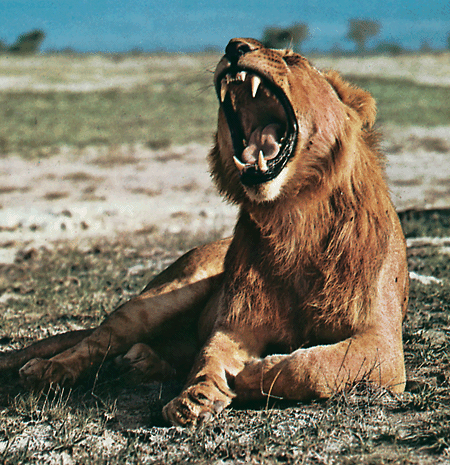Loss of Large Carnivores Threatens People, Too
January 13, 2014
A loss of habitat and prey as well as human persecution are causing alarming declines in the numbers of lions, wolves, and other large carnivorous animals around the world, according to a recent study by scientists at Oregon State University. The researchers’ found that about 75 percent of the 31 large meat-eaters they surveyed are losing population. A majority of the animals have lost more than half of their former territory. The problem is particularly serious in the Amazon, Southeast Asia, and East Africa. In the developing world, the scientists noted, most large carnivores are already extinct. “Human tolerance of these species is a major issue for conservation. We say these animals have an intrinsic right to exist, but they are also providing economic and ecological services that people value,” lead author William Ripple said.

African lions now inhabit less than 17 percent of their traditional territory. (Norman Myers, Photo Researchers)
The scientists reported that the loss of the carnivores causes two “webs of impacts,” which affect humans as well as animal populations. First, as the top predator in an ecosystem disappears, the number of large plant-eaters can expand unchecked. “If the number of large herbivores gets high enough, they will eat themselves out of house and home,” lead author William Ripple said during an online discussion of the research. With vegetation scare, birds and other small animals may starve. The loss of plant life also contributes to erosion, water pollution, and increase in the amount of carbon dioxide released into the atmosphere.
Second, the loss of the top carnivores causes the population of the number-two predator to explode. The rapid spread of coyotes in the eastern United States has tracked a major decline in the number of wolves in that region. A similar situation has developed in Australia. As dingoes have lost ground, the number of red foxes and feral cats has grown rapidly. The rise of these predators, the scientists said, has likely contributed to the extinction of a number of small marsupials and rodents there. As lion and leopard populations fall in many parts of Africa, olive baboons are overrunning cropland. In some areas, children are forced to stay home from school to guard against the pests.
Other experts noted that conservations must also take into account the needs of people living in areas with large, dangerous carnivores. “You cannot expect somebody living in rural Africa or rural Asia to risk being eaten by a lion or a tiger so that your moral sense is gratified back in California or Texas or New York,” ecologist Craig Packer of the University of Minnesota told NBC News. “Conservationists need to recognize that there are legitimate reasons why people want to get rid of these animals.”
Additional World Book articles:
- Balance of Nature
- Biodiversity
- Ecology
- Wildlife in the City (a Special Report)


